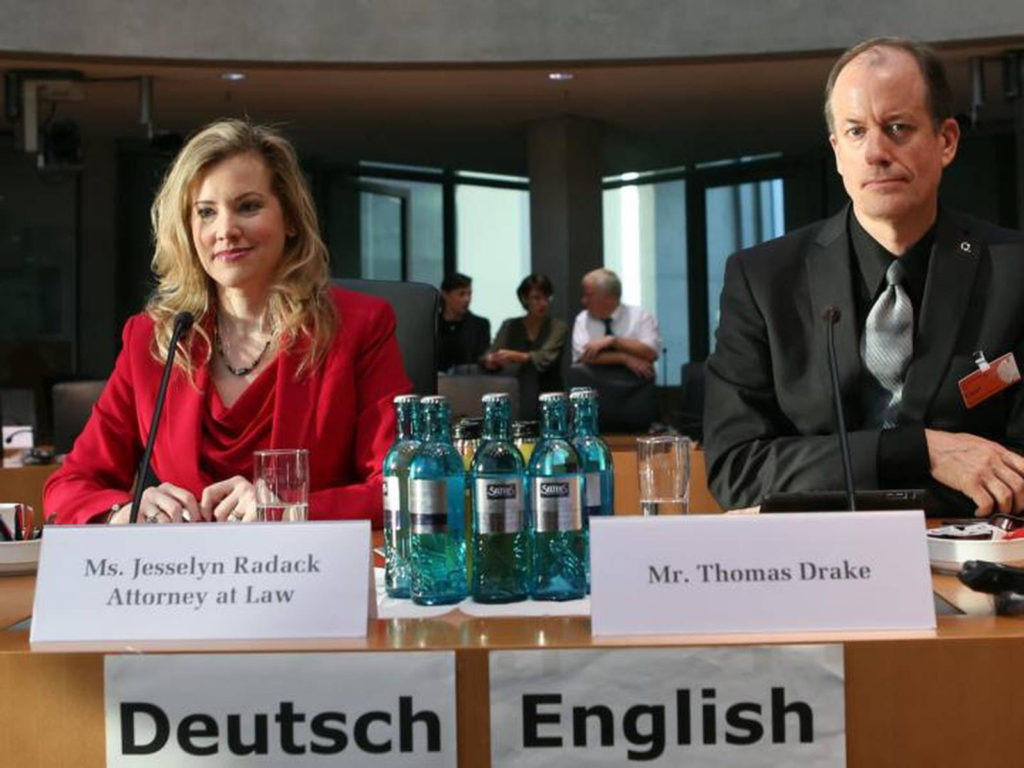
Jesselyn Radack & Thomas Drake testify before the German parliament
As the first nonprofit program within a journalistic organization to provide in-house legal protection for media sources, WHISPeR has redefined the conversation about source protection within the investigative journalism community. Radack was among the first attorneys in the U.S. to use, and insist upon, early-generation encryption programs that applied cryptographic privacy and authentication to online communications. She used air-gapped computers, the Tor network, and the TAILS operating system before many of today’s digital rights organizations even existed. WHISPeR has also educated other good-government organizations, watchdog groups, journalists, and documentary filmmakers on how to protect sources, resulting in many changing their practices to use stronger encryption and advise sources to retain legal counsel earlier in their disclosure path, rather than after they experience retaliation.
WHISPeR’s Espionage Act cases have been used as the primary examples in calls by civil liberties groups to reform the Espionage Act. In 2017, after years of criticism for waging the war on whistleblowers, President Obama commuted the excessive 35-year sentence of Army whistleblower Chelsea Manning. In 2020, Representative Tulsi Gabbard introduced the first legislation that would provide a defense of disclosure in the public interest for Espionage Act defendants accused of making illegal disclosures to the media. In 2021, Representative Ilhan Omar called on President Biden to pardon WHISPeR client drone whistleblower Daniel Hale, who pleaded guilty to one count of violating the Espionage Act.

WHISPeR client Daniel Hale featured in the award-winning documentary, “National Bird”
In addition to WHISPeR’s influence on source protection policy and the Espionage Act, WHISPeR’s clients have made public disclosures that have had tremendous impact on U.S. government policies on surveillance, torture, and drone warfare. NSA whistleblowers Thomas Drake and Edward Snowden drew unprecedented attention to government surveillance policy, including widespread recognition by the American public and courts that the mass, untargeted collection of Americans’ phone records violated the Fourth Amendment. CIA whistleblower John Kiriakou revealed that torture was a policy of the U.S. government, not just the actions of “a few bad apples.” Kiriakou made valuable contributions to the work of countless other human rights advocates, whistleblowers, and lawmakers, and U.S. torture policy was exposed, rejected, and abandoned. WHISPeR’s clients form the drone warfare program, including Lisa Ling, Cian Westmoreland, Brandon Bryant, and Daniel Hale exposed how the U.S. deceives the public about the targeting, effectiveness, and casualties of the drone program – consistently exaggerating the accuracy of strikes and under-reporting civilian and child deaths, labeling the victims “collateral damage,” “TITS” [Terrorists in Training], and other derogatory and dehumanizing terms.
WHISPeR’s amicus brief on behalf of three drone whistleblower clients was cited in a prominent appellate court concurring opinion expressing the need for greater oversight for drone strikes; Hale’s Terror Watchlist revelations helped redress due process violations for American citizens. The notoriously botched drone strike in Kabul that killed civilians shortly before withdrawal – which the U.S. government initially denied before calling it a “tragic mistake” – is precisely what our clients have been disclosing over the course of the global war on terror. As a result, President Biden secretly limited drone strikes away from war zones, tightened targeting rules, and strengthened civilian safeguards, and many in Congress called for systematic reform of America’s drone strike policy.